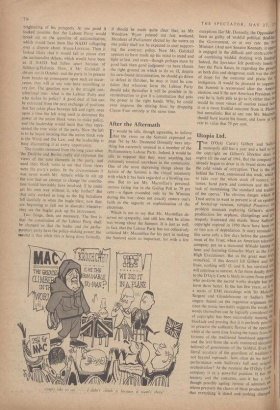After the Aftermath
TT would be idle, though agreeable, to believe 'that the views on the Summit expressed on page 761 by Mr. Desmond Donnelly were any- thing but extremely unusual in a member of the Parliamentary Labour Party. Indeed, it would be idle to suppose that they were anything but extremely unusual anywhere in the community. One_ of the most depressing things about the failure of the Summit is the virtual unanimity with which it has been regarded as a howling suc- cess. But to see Mr. Macmillan's personal- success rating rise in the Gallup Poll to 79 per cent.—a figure exceeded only by Sir Winston during the war—does not exactly restore one's faith in the sagacity or sophistication of the electorate.
Which is not to say that Mr. Macmillan de- serves no sympathy, and still less that he alone was wrong about the Summit. It is just as well, in fact, that the Labour Party has not collectively criticised Mr. Macmillan for his part in making the Summit seem so important, for with a few exceptions like'Mr. Donnelly, the Opposition been as guilty of wishful political thinking the Government, or at any rate the Pr Minister. (And now Senator Kennedy, it apPe is engaged in the difficult and unattractive ft of combining wishful thinking with hindsigh' Indeed, the Spectator felt positively lonely, fore the Paris fiasco, in regarding the prosre' as both dim and dangerous, such was the cite of hope for the outcome and praise for instigators. It would be pleasant to suppose, the Summit is reconvened after the Arnefi‘ election, and if the new American President, o'h ever he is, feels able to go to it, either that the would be more voices of caution raised belt it or a more fruitful outcome from it. Picasa but unrealistic. But at any rate Mr. Macinills should have learnt his lesson, and know at rate to value that 79 per cent.






































 Previous page
Previous page